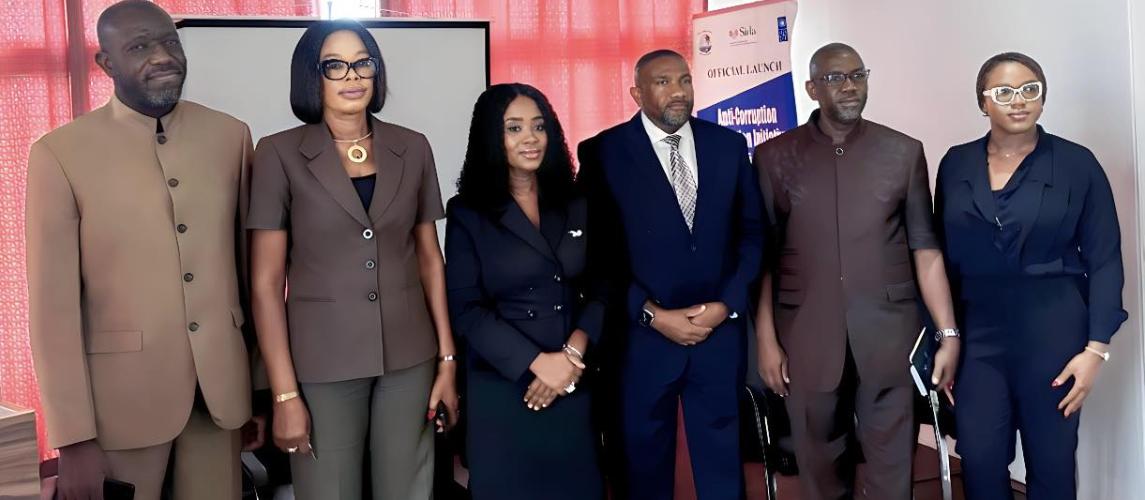About the Liberia Anti-Corruption Commission

The Liberia Anti-Corruption Commission is the country’s biggest and leading anti-graft institution. The establishment of the LACC was part of Government of Liberia (GOL) continuing efforts to formulate and adopt new regulations and measures aimed at strengthening laws and policies that adequately address the peculiar nature of corruption in society.
These efforts have culminated in the Government declaring corruption as “public enemy number one”. The setting up of the Liberia Anti-Corruption Commission (LACC) was a big and motivating step in battling this epidemic which has become a way of life. Truly and evidenced to its commitment, Government adopted a National Anti-Corruption Strategy (NAS) led by the Governance Commission (GC) in partnership with civil society. Under the National Anti-corruption Strategy, it was mandated that a specialize Commission be established that will be squarely responsibility to deal with corruption issues in the country. A team was set up to start the process leading the formation of the Liberia Anti-corruption Commission through the drafting of the legal framework document in the country.
The establishment of the LACC was also accompanied by renewed efforts to strengthen other integrity institutions in the country including the General Auditing Commission (GAC), Public Procurement and Concessions Commission (PPCC), the Liberia Extractive Industry and Transparency Initiative (LEITI), the Internal Audit Agency (IAA), the Financial Intelligence Unit (FIU), the Liberia Revenue Authority (LRA), the Law Reform Commission (LRC) and the Independent Information Commission (IIC). These interventions in part fulfil Liberia’s obligations under international treaties and conventions, including the United Nations Convention against Corruption (UNCAC), to which Liberia is a signatory and state-party.
Meanwhile, from the time the LACC was established in 2008, it has made significant progress in the fulfilment of its core mandates – education and prevention, and investigation and prosecution. The Commission has been able to adopt several measures and institutionalized policies intended to strengthen the fight against this menace. During the period, the LACC has hired and continues to hire relevant professional staff, drafted and ratified operational instruments; and investigated and prosecuted several cases of corruption. The progress made was achieved under difficult situation, including inadequate financial and material resources.
Despite these visible progress, challenges still remain in the overall operational framework of the Commission. Also, the legal framework was still inadequate and the commission found it difficult to control corruption. This again led stakeholders to move back to the drawing board to answer critical questions in the anti-corruption architecture of the country. The public was interested in the snail-pace at which prosecution of corruption cases were been carry out.
In 2022, the government of Liberia took deliberate steps to revisit the anti-corruption strategy of the country. This action resulted in the passage of groundbreaking legislations to strengthen the fight against corruption in the country. Today, the LACC can proudly say it has direct prosecutorial powers as enshrine in the amended Act of the LACC passed in 2022 by the Legislature. This means that the Commission does not have to wait for the Ministry of Justice but can now prosecute persons accused of corruption.
With the New Act in place and the surmountable financial challenges in recruiting additional investigators, lawyers and acquisition of logistics to facilitate the work of the Commission, all is set for the LACC to go to court.
Additionally, the Legislature has passed the Whistle Blower Act and the Witness Protection Act for the public to assist the LACC in reporting acts of corruption.
Furthermore, another good side of the new anti-corruption framework is that all three branches of government will now declare their assets to the LACC. This is in contrast to what happened in the past where the entire assets declaration system was scattered across government. The new LACC gives the LACC the direct power to control the entire assets declaration process of the country. The Legislature, Executive and Judiciary will now report their assets declaration papers to the Liberia Anti-corruption Commission. In the past, the three branches of government submitted assets declaration papers to themselves.
While the LACC applauds this move, the Commission still awaits action on the removal of statute of limitation on corruption cases and the establishment of specialized court on corruption.
